We all know one day you’ll have robots steal your job, in this two part series we teach you how to know if you’re vulnerable and how to win! To begin with though let me read to you an interesting fact I found few months ago:
In 2012, Google, for example, generated a profit of nearly $14 billion while employing fewer than 38,000 people. Contrast that with the automotive industry. At peak employment in 1979, General Motors alone had nearly 840,000 workers but earned only about $11 billion—20 percent less than what Google raked in. And, yes, that’s after adjusting for inflation. – Rise of the Robots
It outlined a trend I’ve been well aware of for quite a while now which is the growing rise of machine automation. At first thought when reading the above most people see it as great news, Google was able to make 20% more profit whilst employing only 4.5% of the people GM did. That’s quite the achievement and they’re right! However it also bypasses a critical issue which is that it now takes considerably fewer people to do the same job.
I’m sure this isn’t shocking news to most people. There’s articles all over the web writing about it but I would like to address the issue from a more personal viewpoint. Most pieces just prattle on about this looming death cloud of and robots steal your job but what does that really mean for you and I? More importantly what aspects are within our control and how can we prepare for and embrace this change?
Table of Contents
How Robots Steal Your Job
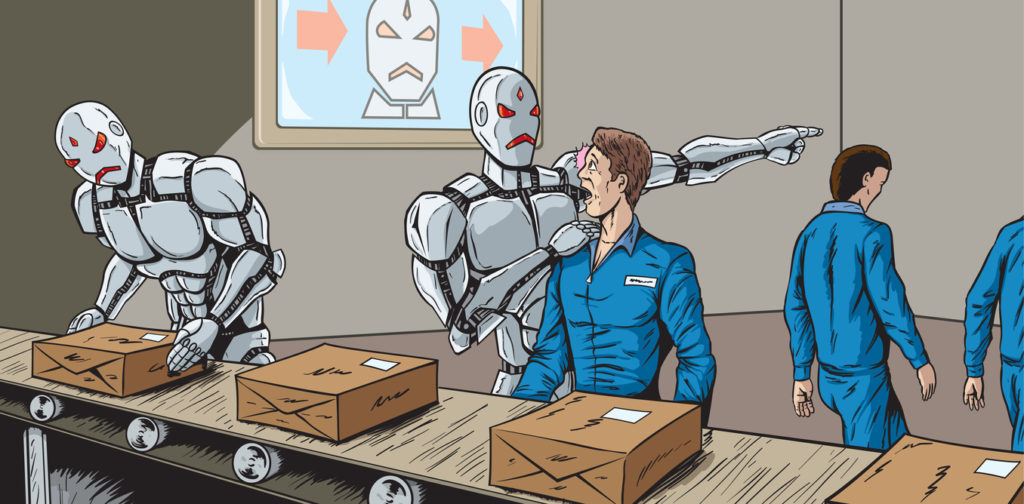
Many seem to take “robots steal your job” quite literally. They picture a humanoid shaped robot walking up to their desk, kicking their weak fleshy ass to the floor and telling them to beat it, the robots are running things now! And while some people believe that this will actually happen, most just ignore the whole argument.
They’ve never seen a literal robot do such a thing which is a good point. Even in advanced manufacturing plants humanoid robots basically don’t exist (it’s usually just a big arm). The closest thing I’ve ever seen is the Boston Dynamics Atlas robot (which is insanely freaking cool BTW).
So when all these forecasters and analysts and people predicting the future say that “robots will steal your job” people assume they mean literal humanoid robots… which don’t really exist… so their argument must be stupid and wrong.
But they’re not unfortunately.
Robots aren’t just going to steal our jobs in the future… they’ve already been doing it for decades. Haven’t you seen them?
You probably have. You likely see them every day and yet don’t even know it because “robots” in this context is mainly just a term for any computational automation which most commonly is done through software.
You see, robots aren’t going to come in, boot you off your chair and sit down and start typing on your PC. No, that would be hugely inefficient and costly to make! It’s far, far cheaper and better to just have software do the task on that same PC you work on!
Why It’s Accelerating
Businesses welcome this with open arms usually under the guise of “efficiency improvements” or “optimisation”. To be honest, I love it too! I constantly search for the most efficient, easiest way to do something and using online, automated systems is perfect for this! Most people in general love automation as it makes their life easier, usually cheaper and faster too. Some also love it because it means they don’t have to “deal” with people.
My favourite example of this is the “self-checkout” systems that have been introduced into large food shopping stores. There used to be 15 isles of conveyor belts with 15 employees… now there’s maybe one or two of them and one of those is supervising the 15 automatic self-checkout systems.
This is what “robots stealing our jobs” truly looks like!
Studies into this have actually revealed that it is more pronounced when recessions occur. In the past, the stock market would crash and burn and 10,000 jobs would be lost due to businesses contracting. After some years all those jobs would be available again.
Now instead the same crash occurs, the same 10,000 jobs are lost… but after some years only 1,000 jobs are available to do the work as automation has taken up the slack. The end result is that after each recession it now takes far longer for those jobs lost to be recovered.
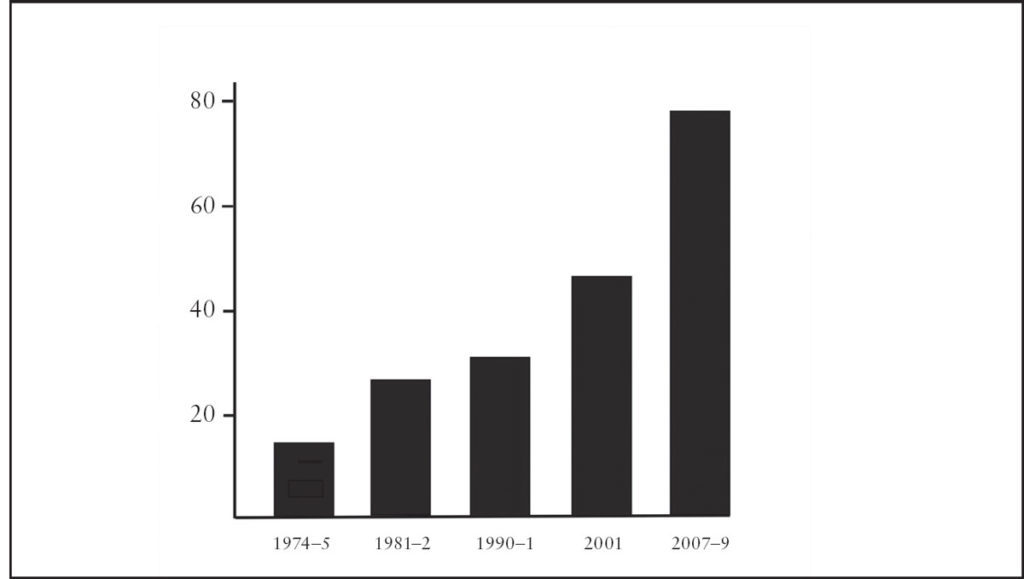
Who’s Responsible
In 2011 Apple built a massive $1 billion data centre that it uses to run its cloud services. Stretching across hundreds of acres, the now 5 year old facility only requires 50 employees to run.
Over time, as markets crash and are rebuilt or new businesses emerge new systems are coming online that don’t need humans to operate. We as consumers of these services often prefer them. They are cheaper, faster, available 24/7 and provide better service in general.
So you have a perfect storm where businesses want to push forwards for obvious profit reasons and at the same time consumers are also constantly demanding these new features, cheaper prices and more availability too.
Virtually the only thing stopping all jobs being overwritten is that the technology isn’t there… yet.
A Robot Could NEVER Do My Job
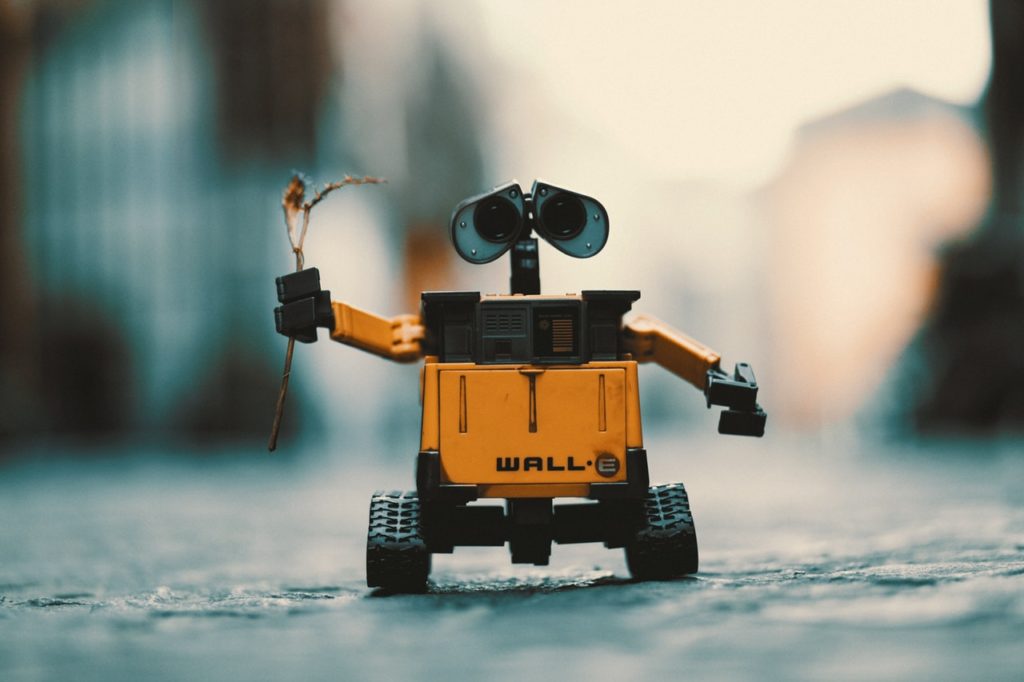
Said the lift conductor. Said the manufacturer worker. Said the accountant. Said the lawyer. Said the doctor.
Another common way robots are stealing our jobs is by simply making them obsolete. Snail mail is a perfect example of this and AusPost has been having huge issues dealing with it. The manufacturers of records, tapes, CD’s and DVD’s are all growing largely irrelevant due to online streaming.
People correctly assume that it’d be all but “impossible” for a machine to build a DVD from start to finish with zero human input and they’re right! But now thanks to Netflix they’re obsolete.
Up until the last decade or so most of the job replacement has been in the physical domain. Robot arms to build everything from cars to phones, robot check-outs to let you buy your own groceries. Online stores to eliminate physical stores.
Airbnb to make the idea of a Hotel a bit antiquated or smartphones to make calculators, film, and more obsolete. However with the increase in computational power and machine learning it’s breaching into the realm of white collar jobs more and more.
Automatic programs are now writing a huge number of online articles and you’ve probably already read them and not even noticed. Ironically, you can read about this through articles written online:
The Associated Press uses Automated Insights’ Wordsmith platform to create more than 3,000 financial reports per quarter. It published a story on Apple’s latest record-busting earnings within minutes of their release. Forbes uses Narrative Science’s Quill platform for similar efforts and refers to the firm as a partner.
Yes, that is major online newspapers printing “articles” that are entirely written by machine learning systems. They even tested it and few, if any, humans could tell the difference.
Even The Elite Aren’t Safe

Automatic programs are now also doing very meaningful science, allowing us to discover new laws of physics and handily beating even the smartest of the smart, doctors, at their own work:
Watson’s successful diagnosis rate for lung cancer is 90 percent, compared to 50 percent for human doctors.
Doctors are a particularly interesting case because most people will tell you that they’d never use a robot doctor over a human one. But ask yourself, how willing would you be to allow a computer to review your biopsy results and make the call on whether you have lung cancer given the above percentages? I’m sorry, but I’d pick the program every time!
Lawyers aren’t safe either, especially legal aides. Computers now run the entire stock market and Accountants haven’t been safe for years. I’m sure you all know about automation in call centres and now even the managers are starting to feel the pinch too.
Some of the biggest parts of being a (mid layer) manager is in collecting, formatting and reviewing company data and presenting that reviewed data (with recommendations) to their managers.
Nor Managers
As our companies begin to employ more advanced systems that review, summarise and make predictions or recommendations there will be a smaller need for the human. Eventually companies will flatten their structures out. This results in a few managers at the top and all the workers at the bottom.
These companies will have powerful automation and analysis tools constantly keeping track of metrics and issuing the most finely tuned industry standard (and profitable) recommendations to the top brass.
In a very recent publication Google announced that by handing the keys to their entire data centre cooling system over to a Deep Neural Net, managing over 80 monitored parameters and optimising them all minute by minute they saw a unheard of 40% decrease in energy used for cooling.
It’s painfully clear that automation is coming, to every job, to every field and the speed is increasing.
So What.
This is all very fascinating and fun to read about and watch but at the end of the day, how is this all going to affect you?
You don’t care if Dr Snooty Pants loses his fancy $500,000/year doctor job to the new and improved Dr Watson. You want to know what it will mean for your work, your job and your future. I get that. So I found you a really cool and handy online calculator that will tell you the likely hood of your job being automated (there’s also this one too) 🙂
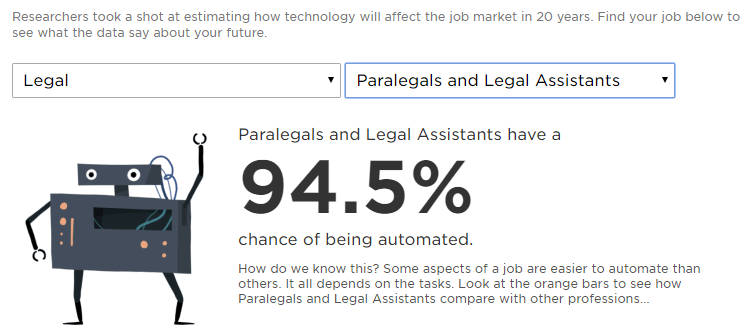
So now you know how susceptible your job is to automation over the next 10-20 years. Then what?
I realised long ago that this trend is happening and will likely one day see me out of a job. At the very least it will make it incredibly hard to find and maintain a job, resulting in less pay. So rather than cry about it I decided to take matters into my own hands. I want to make sure that by the time 10-15 years is up I won’t need a job.
How To Profit Instead
The first step in this plan was to get out of debt which meant paying off our mortgage. Fast. This has been one of the main drivers behind our relentless pursuit of becoming mortgage free. By the time it hits 2027, it’s going to be significantly different in terms of finding and maintaining a job. You’ll want to be in peak financial shape by then.
If you’re a legal aid and finding work becomes impossible you’re going to have to leave that profession. You’ll then have to re-train up on something else that isn’t easy to automate. Difficult life changes like this can be made simpler without a mortgage debt hanging over your head.
You Can’t Fight It When Robots Steal Your Job

As noted earlier, the future is coming. It’s actually going to be coming faster and faster as each advanced technology builds on the last. This is an essential part of why automation is such an underrated risk to most people. It’s also why they’ll never see it coming! Most people think linearly (ie. 1+1+1+1….) whereas technology grows exponentially (ie. 1+2+4+8+16…). Besides everyone’s brains naturally thinking linearly, we also heavily refer to the past in order to predict the future. Unfortunately this past has mostly been linear too.
In some cases, past performance is very useful in predicting the future. People’s actions are a perfect example of this. However when you’re trying to predict where technology will go everything is slowly turning exponential as software eats the world. IT, computers, programming and automation are all no strangers to exponentially increasing returns.
Thus when existing businesses and industries get drawn into this realm they start to benefit from the same exponential increases. Unfortunately we all still view those industries as they have been in the past (linear). This is what leads everyone to be “shocked” when solar panel prices drop by 12%+ yearly.
When it comes to how much RAM there is in a computer we’re all very used to how the story goes. You have 4GB one year, then after a bit it jumps to 8GB, then 16GB, 32GB etc. This is exponential growth but it doesn’t seem weird because it’s been happening for decades now with computers.
When Energy Goes Exponential

When it comes to the energy industry the amount of energy you get per $ of coal hasn’t changed in 100 years. There’s been some inflation and some improvements but nothing huge. Contrast that with solar which has plummeted in cost, halving in the last 6 years. Energy production is now in the realm of technology. As such, it now benefits from technologies exponential advancements.
This means within about 10-15 years it’s highly likely that all power will be essentially free. Due to how much we’ll be able to produce per dollar it will become like RAM. Rather cool but again, it sounds “wrong” or “impossible” because we’re not used to thinking about energy production in this way.
We Are Just Getting Started
So as you can see, it’s very easy to under predict the development of technology and the more it develops, the further on the exponential curve it gets and the more pronounced the jumps are. If you’re going from 2GB of RAM to 4GB, well that’s only an increase of 2GB.
Going from 32GB to 64GB though is a whopping 32GB increase or 16x more than the 2GB->4GB jump! In fact, it’s been noted that given how far technology has developed over the past few decades, experts estimate we’re actually at the “knee of the curve”, the part of the exponential curve where it just rockets into infinity. Wait But Why’s fantastic AI Revolution piece illustrates this perfectly with their first diagram:
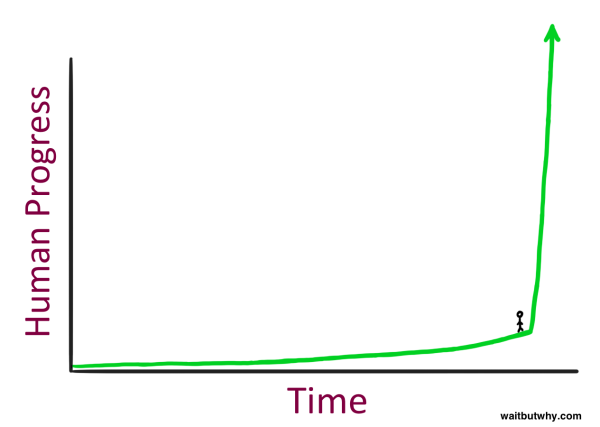
We’re all running around frantically saying how life is “so fast paced these days”. The truth is, you haven’t seen anything yet! As those bigger and bigger jumps start to take hold look out. Change will come about quicker and quicker resulting in more jobs being pushed out at an ever increasing rate.
When most hear of these revelations they get all defensive and want to protect themselves. They push back and resisting the change that’s taking place. Just like the huge energy companies are resisting renewables or Kodak resisted digital cameras.
This is never a wise long term strategy. At best you sacrifice everything in the future for some small, minor gains in the present. Not what we want!
Kicking Ass Against Automation
So rather than push back, rather than cry when our job is inevitably automated in 5, 10, 15 years’ time what if instead we were ready for it?

What if by that point your mortgage is paid off and you have enough money saved up that you never have to work again for the rest of your life? To a lot of people it sounds like a pipe dream. One that’s only possible if they win the mega draw 6000 or something.
However both of these fantastic results can be achieved by hitting a roughly 70% savings rate. If you can do that then you also get to benefit from exponential returns and this results in amazing things:
| Savings Rate | Working Years Until Retirement |
|---|---|
| 5% | 66 |
| 10% | 51 |
| 15% | 43 |
| 20% | 37 |
| 25% | 32 |
| 30% | 28 |
| 35% | 25 |
| 40% | 22 |
| 45% | 19 |
| 50% | 17 |
| 55% | 14.5 |
| 60% | 12.5 |
| 65% | 10.5 |
| 70% | 8.5 |
| 75% | 7 |
| 80% | 5.5 |
| 85% | 4 |
| 90% | under 3 |
| 95% | under 2 |
| 100% | Zero |
If you’d like learn more about how these figures were generated you can stop by Mr Money Mustache where he explains it excellently. For now though I can assure you many people the world over use very similar numbers to plan for their early retirement or “financial independence” (as they don’t just sit around playing golf).
How To Save 70%
Obviously obtaining a 70% savings rate is no small thing. To achieve this I’d recommend looking at the excellent resources over at our sister site Mutilate The Mortgage. Once you’re hitting that 70% savings rate, the above chart tells us that you’ll be able to save enough money over 8.5 years and then retire. Forever.
You can live from that point onwards off your savings and this isn’t just for 10 years, it’s indefinitely. You can retire at 35 and live off the returns for another 70 years. Best of all, over that period it doesn’t matter if a robot steals your job, because you won’t need it!
Stellar Habits
Although 70% is a target I talk about as being important, I also chose it initially as it continues to help you kick ass even after your mortgage is dead. You develop this one single habit, saving 70% of your income, and it enables you to essentially crush anything and everything life might throw at you.
Obviously how you invest that saved money is critically important but that information is outside the scope of this post but there’s excellent resources all over the web for that though.
If you can set yourself up with the correct habit of saving 70%, your life will be orders of magnitude easier. You will also be preparing ahead of time for what will be a huge issue in the future. Even starting from scratch, at a 70% savings rate, you can have your house paid for and be financially independent in 15 years.
If you start this journey when you finish school or graduate that means reaching “retirement” at 33 or 37! You’ll also have an answer the next time they ask “so where do you see yourself in 10 years time?” 😀
No Downside

This higher level strategy is a fantastic way to plan out your life too. Consider if I’m wrong, even if computers, robotics and automation for some reason just freeze and never evolve. You’re still able to either quit your day job after 15 years or continue working on your own terms. You can travel the world for 5 years, come back and volunteer to help people.
Maybe you might completely change careers. You could pursue a long lost dream with the knowledge that it doesn’t matter if you completely fail. Some might start their own business or just stay at home all the time taking care of their kids. It’s under your control which is how your life should be.
It’s a simple and highly flexible strategy that relies on nothing external:
- Hit a 70% savings rate and mutilate your mortgage
- Once it’s paid off, divert that same 70% savings rate to properly diversified investments
- Enjoy your life through the years and retire after your investments are enough to support you
And the best part? You can embrace the future, its amazing changes and have a great time living in it! What advancement are you most looking forward to? Let us know in the comments below!
The benefits include: 1) How to get those silky smooth videos that everyone loves to watch, even if you're new 2) How to fly your drone, from taking off to the most advanced flight modes 3) Clear outlines of how to fly with step-by-step instructional demonstrations and more 4) Why flying indoors often results in new pilots crashing their drone 5) What other great 3rd party apps are out there to get the most out of your drone 6) A huge mistake many pilots make when storing their drone in the car and how to avoid it 7) How to do all of these things whilst flying safely and within your countries laws.





